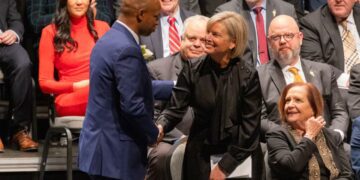By Hank Beckman -
Last week’s column listed six pants-on-fire whoppers in the vice presidential debate, where Kamala Harris introduced herself to much of the nation as someone who tosses off fibs—big and small—as casually as she changes clothes; integrity isn’t her strong suit.
If she ascends to the presidency after the guy from the basement inevitably has to give up the presidency or dies, no honest person can be surprised if she dissembles about the Green New Deal, foreign policy, or Medicare for All; lying wouldn’t violate any of the principles that have governed her life so far.
What’s even more troubling is that Ms. Harris’s career apparently got a significant boost the old fashioned way—through a relationship with a man.
Although seldom remarked on by anyone in mainstream media, it is common knowledge that when she was just starting out in public life, she was the mistress of former California State Assembly Speaker Willie Brown.
Though he was technically separated from his wife, Brown was still married when he conducted a relationship with Harris from 1994 to 1995. The two met when she was an assistant district attorney in Alameda County. He was 60 at the time; Harris was 29.
He later appointed her to two state bodies, the California Unemployment Insurance Board and the Medical Assistance Commission. While the relationship was common knowledge in California, most people outside the state are are unaware of it.
Brown has never hid the relationship and confirmed his influence on her career in a Jan. 26, 2019 San Francisco Chronicle article.
“Yes, I may have influenced her career by appointing her to two state commissions when I was assembly speaker,” Brown was quoted. “And I certainly helped with with her first race for district attorney in San Francisco.”
You’d think a 60-year-old man, separated from the woman with whom he has three children, dating an attractive young woman half his age would raise a few eyebrows, especially in the feminist community. Isn’t there a school of thought that maintains there can be no consensual relationship when a clear power imbalance exists between the people involved? Apparently it doesn’t apply in this case, because there has been remarkably little comment on the relationship since Harris accepted the nomination for vice president.
It can be argued that Brown’s support and help getting started in her career, both in the appointments to the commissions and in her first race for district attorney, were crucial to her reaching the level in public life that she has. Without Brown’s patronage, she might be just another government attorney, unremarkable in any way.
No matter how the Left might rationalize the relationship by maintaining it was consensual and conducted openly, with Brown then separated from his wife, there is no getting around the fact that it looks to normal people like a case of a woman trading sex for professional advancement. While obviously not quite the same as a woman outright selling sex for cash, it’s definitely in the same neighborhood.
Whatever one thinks of the way she conducts her personal affairs, the implicit quid pro quo nature of the relationship is obviously not the way we should choose our public servants.
Nothing outrages Americans more than the thought of someone being rewarded for something other than merit. Whether it’s family connections, racial preferences or sex, advancement not earned might be common in America, but it’s not something that sits easy with most of us.
And that goes double for public servants because, after all, they work for all of us. (At least in theory) We want competence and integrity in our leaders, not someone who got the job because of their family name, skin color, or any other unethical strategies they might have employed.
Speaking of competence, Harris’s tenure as San Francisco’s District Attorney wasn’t exactly a model of efficiency.
Edwin Ramos was a illegal alien from El Salvador and known member of the notoriously violent MS-13 street gang. He’d already had multiple run-ins with the law including being arrested for assault and attempted robbery.
Arrested again when a passenger in a car he was driving was caught with a gun, prosecutors declined to formally charged him for lack of evidence.
Despite being warned by the police about his immigration status and known gang ties, Ms. Harris’s office declined to take any action against him.
So he was free to later murder a man and his two sons when he mistook one of the sons for a rival gang member; a murder for which Ms. Harris’s office declined to seek the death penalty.
Then there were those 1,000 or so drug arrests that had to be dismissed during Harris’s tenure as D.A.
It was revealed that because of illegal activity in the city’s crime lab, much of the evidence was from a lab technician that “had become increasingly UNDEPENDABLE for testimony,” as quoted in a 3-19-19 article in the Washington Post.
Harris initially blamed the police, but it was revealed that she withheld information from defense attorneys that she was legally required to provide.
Superior Court Judge Anne-Christine Massulo’s opinion was quoted in the same article as saying that Harris “failed to disclose information that should have been disclosed.”
As California’s Attorney General, her incompetence was on display once again in the case of Kevin Cooper, convicted of murdering four people and severely wounding a fifth. The crime was especially gruesome, with the killer hacking the victims 143 times.
That the case against Cooper was shaky enough that one grandmother of the victims doubted that one person could have carried it out, an appellate court judge was quoted in a dissent as saying “California may be about to execute an innocent man,” and the surviving victim originally said that the attackers were three or four white of Latino men. Cooper is black.
Harris’s office opposed advanced DNA testing that might prove that Cooper was innocent and never really explained why she opposed testing. After leaving office, she changed her mind about the testing but never explained why she opposed it in the first place. Her only public comment, to a New York Times columnist, was that she “feels awful about this.”
Historical counterfactuals are always dicey propositions; one can ask “what if” this or that had been done differently and come up with any answer one desires about a particular historical event.
So we can’t know with any degree of certainty how these cases would have turned out without Willie Brown’s help in beginning Harris’s career.
But her sorry record as an executive should make us all leery of putting her within a heartbeat of the presidency.







